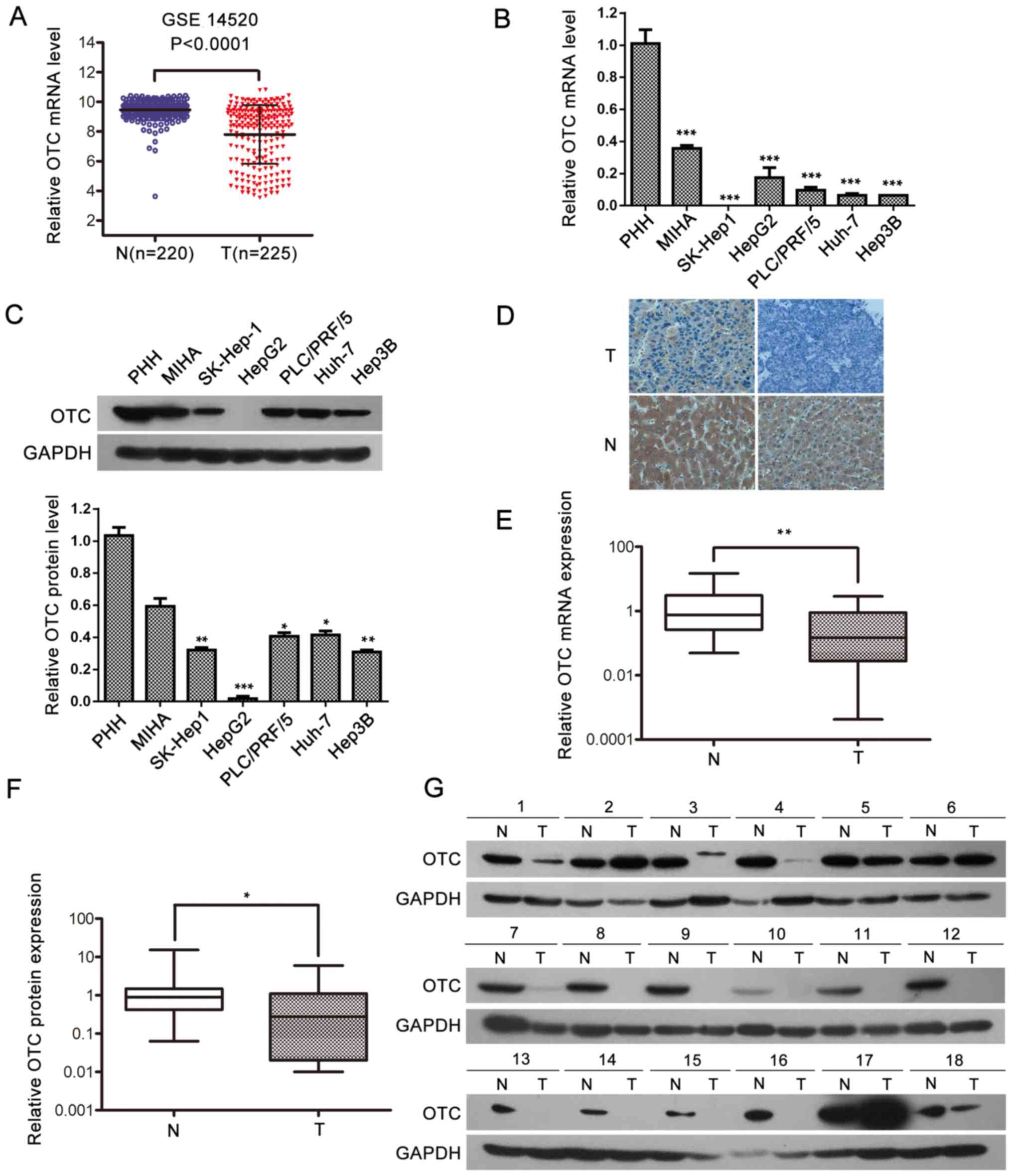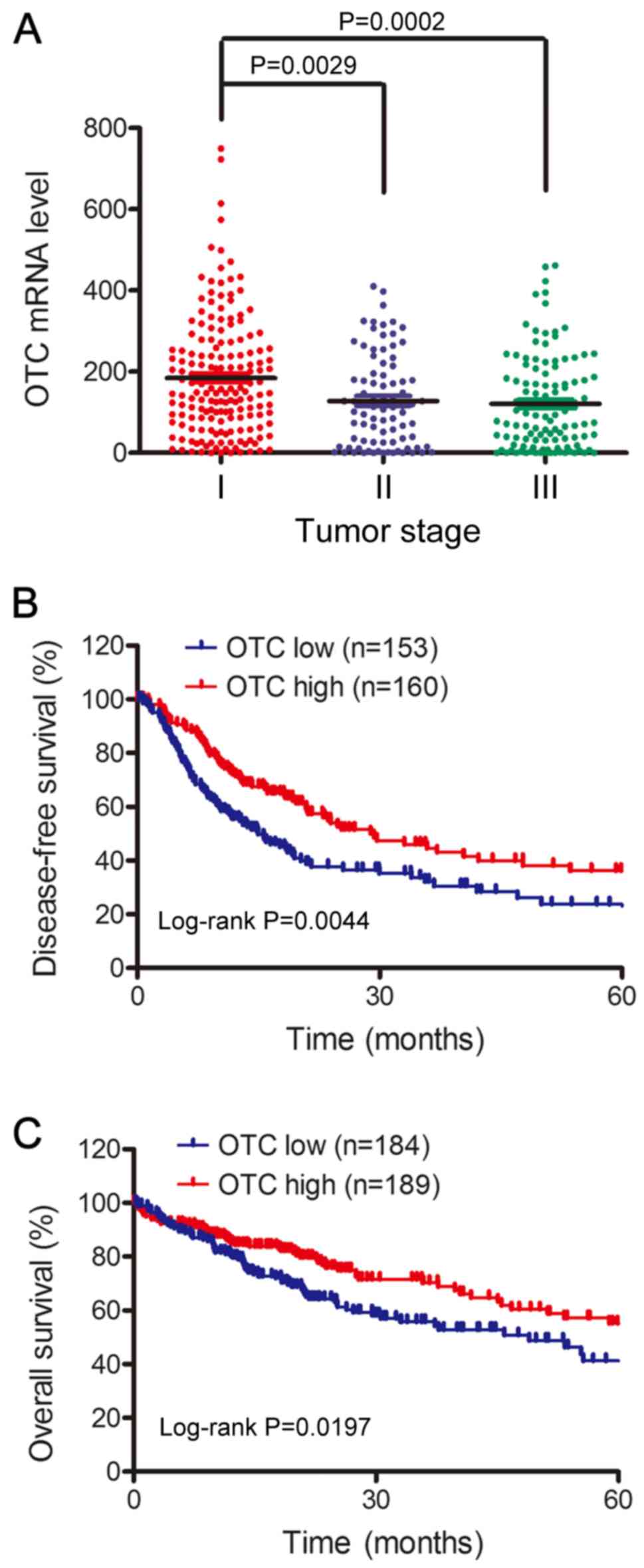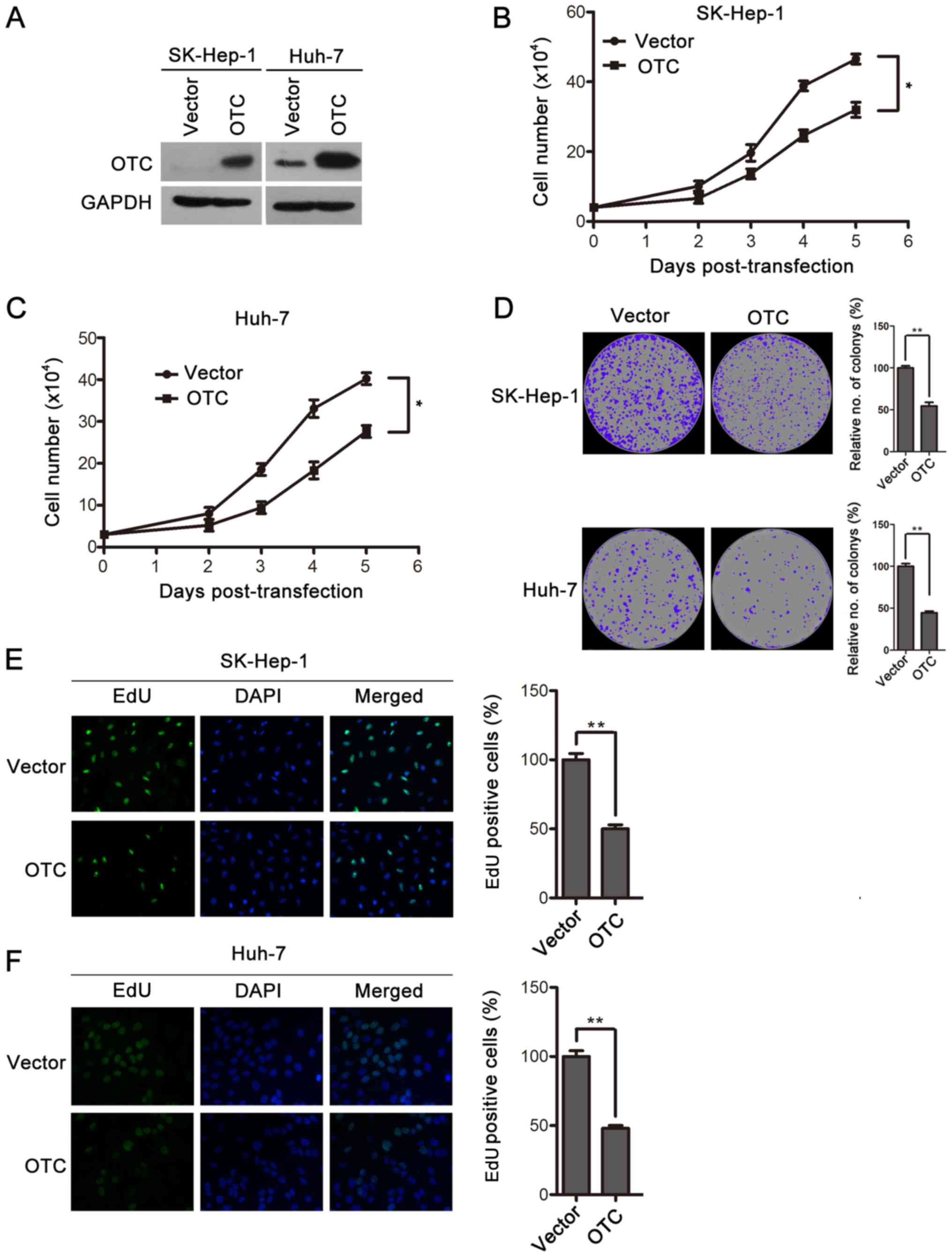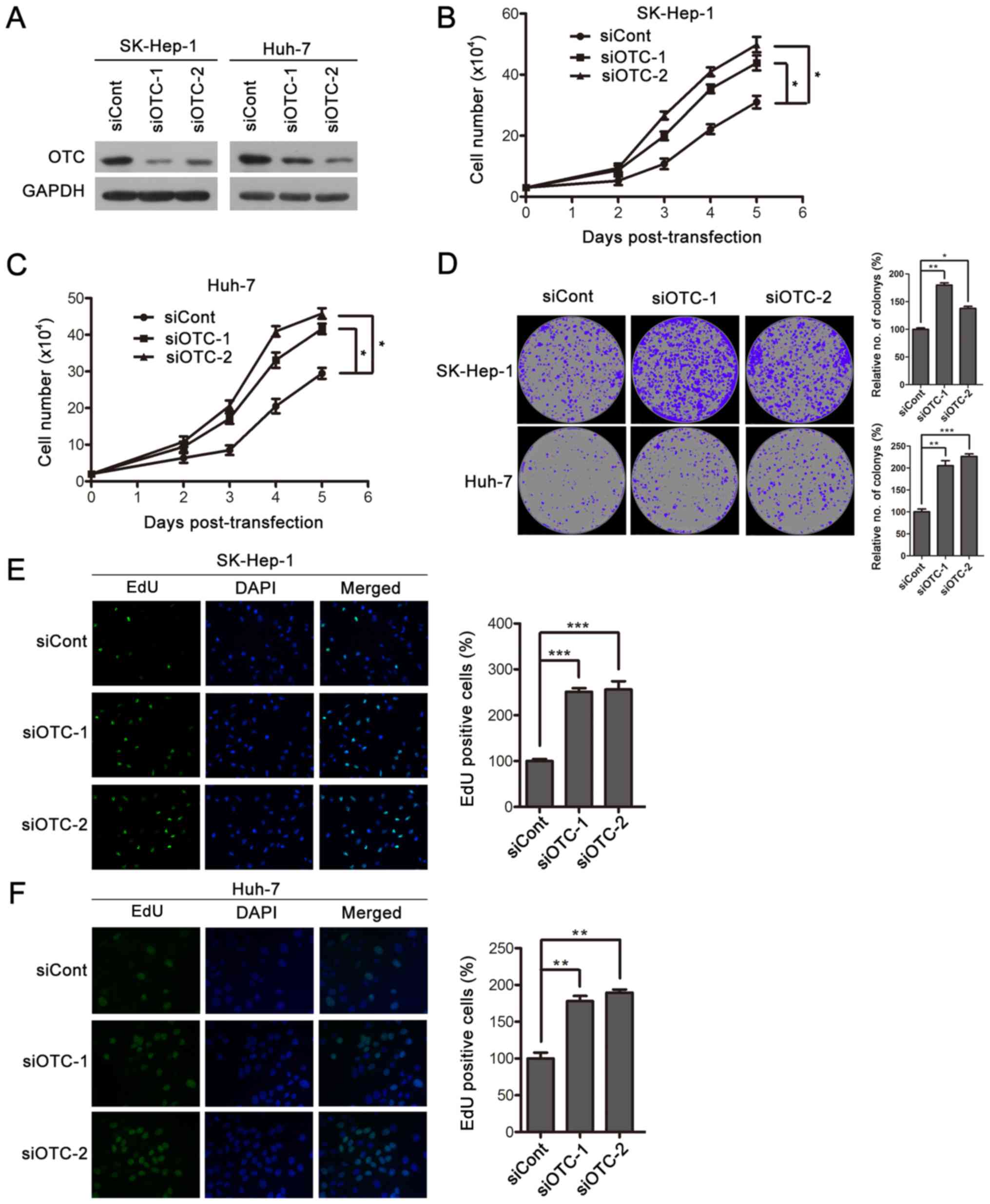|
1
|
Torre LA, Bray F, Siegel RL, Ferlay J,
Lortet-Tieulent J and Jemal A: Global cancer statistics, 2012. CA
Cancer J Clin. 65:87–108. 2015. View Article : Google Scholar : PubMed/NCBI
|
|
2
|
El-Serag HB: Hepatocellular carcinoma. N
Engl J Med. 365:1118–1127. 2011. View Article : Google Scholar : PubMed/NCBI
|
|
3
|
Bray F, Ferlay J, Soerjomataram I, Siegel
RL, Torre LA and Jemal A: Global cancer statistics 2018: GLOBOCAN
estimates of incidence and mortality worldwide for 36 cancers in
185 countries. CA Cancer J Clin. 68:394–424. 2018. View Article : Google Scholar : PubMed/NCBI
|
|
4
|
Forner A, Reig ME, de Lope CR and Bruix J:
Current strategy for staging and treatment: The BCLC update and
future prospects. Semin Liver Dis. 30:61–74. 2010. View Article : Google Scholar : PubMed/NCBI
|
|
5
|
Raza A and Sood GK: Hepatocellular
carcinoma review: Current treatment, and evidence-based medicine.
World J Gastroenterol. 20:4115–4127. 2014. View Article : Google Scholar : PubMed/NCBI
|
|
6
|
Yu W, Lin Y, Yao J, Huang W, Lei Q, Xiong
Y, Zhao S and Guan KL: Lysine 88 acetylation negatively regulates
ornithine carbamoyltransferase activity in response to nutrient
signals. J Biol Chem. 284:13669–13675. 2009. View Article : Google Scholar : PubMed/NCBI
|
|
7
|
Auron A and Brophy PD: Hyperammonemia in
review: Pathophysiology, diagnosis, and treatment. Pediatr Nephrol.
27:207–222. 2012. View Article : Google Scholar : PubMed/NCBI
|
|
8
|
Helman G, Pacheco-Colón I and Gropman AL:
The urea cycle disorders. Semin Neurol. 34:341–349. 2014.
View Article : Google Scholar : PubMed/NCBI
|
|
9
|
Capistrano-Estrada S, Marsden DL, Nyhan
WL, Newbury RO, Krous HF and Tuchman M: Histopathological findings
in a male with late-onset ornithine transcarbamylase deficiency.
Pediatr Pathol. 14:235–243. 1994. View Article : Google Scholar : PubMed/NCBI
|
|
10
|
El-Serag HB and Mason AC: Rising incidence
of hepatocellular carcinoma in the United States. N Engl J Med.
340:745–750. 1999. View Article : Google Scholar : PubMed/NCBI
|
|
11
|
Wilson JM, Shchelochkov OA, Gallagher RC
and Batshaw ML: Hepatocellular carcinoma in a research subject with
ornithine transcarbamylase deficiency. Mol Genet Metab.
105:263–265. 2012. View Article : Google Scholar : PubMed/NCBI
|
|
12
|
Wang L, Bell P, Morizono H, He Z, Pumbo E,
Yu H, White J, Batshaw ML and Wilson JM: AAV gene therapy corrects
OTC deficiency and prevents liver fibrosis in aged OTC-knock out
heterozygous mice. Mol Genet Metab. 120:299–305. 2017. View Article : Google Scholar : PubMed/NCBI
|
|
13
|
Cuccurullo V and Mansi L: AJCC cancer
staging handbook: From the AJCC cancer staging manual (7th
edition). Eur J Nucl Med Mol Imaging. 38:408. 2011. View Article : Google Scholar
|
|
14
|
Edmondson HA and Steiner PE: Primary
carcinoma of the liver: A study of 100 cases among 48,900
necropsies. Cancer. 7:462–503. 1954. View Article : Google Scholar : PubMed/NCBI
|
|
15
|
Dang H, Takai A, Forgues M, Pomyen Y, Mou
H, Xue W, Ray D, Ha KCH, Morris QD, Hughes TR and Wang XW:
Oncogenic activation of the RNA binding protein NELFE and MYC
signaling in hepatocellular carcinoma. Cancer Cell. 32:101–114 e08.
2017. View Article : Google Scholar : PubMed/NCBI
|
|
16
|
Livak KJ and Schmittgen TD: Analysis of
relative gene expression data using real-time quantitative PCR and
the 2(-Delta Delta C(T)) method. Methods. 25:402–408. 2001.
View Article : Google Scholar : PubMed/NCBI
|
|
17
|
Chen J, Zhang B, Wong N, Lo AW, To KF,
Chan AW, Ng MH, Ho CY, Cheng SH, Lai PB, et al: Sirtuin 1 is
upregulated in a subset of hepatocellular carcinomas where it is
essential for telomere maintenance and tumor cell growth. Cancer
Res. 71:4138–4149. 2011. View Article : Google Scholar : PubMed/NCBI
|
|
18
|
Tommasi S, Zheng A, Weninger A, Bates SE,
Li XA, Wu X, Hollstein M and Besaratinia A: Mammalian cells acquire
epigenetic hallmarks of human cancer during immortalization.
Nucleic Acids Res. 41:182–195. 2013. View Article : Google Scholar : PubMed/NCBI
|
|
19
|
Ramboer E, De Craene B, De Kock J,
Vanhaecke T, Berx G, Rogiers V and Vinken M: Strategies for
immortalization of primary hepatocytes. J Hepatol. 61:925–943.
2014. View Article : Google Scholar : PubMed/NCBI
|
|
20
|
Mori M, Miura S, Morita T, Takiguchi M and
Tatibana M: Ornithine transcarbamylase in liver mitochondria. Mol
Cell Biochem. 49:97–111. 1982. View Article : Google Scholar : PubMed/NCBI
|
|
21
|
Liu H, Dong H, Robertson K and Liu C: DNA
methylation suppresses expression of the urea cycle enzyme
carbamoyl phosphate synthetase 1 (CPS1) in human hepatocellular
carcinoma. Am J Pathol. 178:652–661. 2011. View Article : Google Scholar : PubMed/NCBI
|
|
22
|
Hallows WC, Yu W, Smith BC, Devries MK,
Ellinger JJ, Someya S, Shortreed MR, Prolla T, Markley JL, Smith
LM, et al: Sirt3 promotes the urea cycle and fatty acid oxidation
during dietary restriction. Mol Cell. 41:139–149. 2011. View Article : Google Scholar : PubMed/NCBI
|
|
23
|
Song CL, Tang H, Ran LK, Ko BC, Zhang ZZ,
Chen X, Ren JH, Tao NN, Li WY, Huang AL and Chen J: Sirtuin 3
inhibits hepatocellular carcinoma growth through the glycogen
synthase kinase-3β/BCL2-associated X protein-dependent apoptotic
pathway. Oncogene. 35:631–641. 2016. View Article : Google Scholar : PubMed/NCBI
|
|
24
|
Liu Q, Ding MH, Zhang R, Chen HX, Zhou XX,
Xu HF, Chen H and Peng KL: Study on mechanism of thyroid
cytotoxicity of ammonium perchlorate. Zhonghua Lao Dong Wei Sheng
Zhi Ye Bing Za Zhi. 31:418–421. 2013.(In Chinese). PubMed/NCBI
|
|
25
|
Luo C, Shen G, Liu N, Gong F, Wei X, Yao
S, Liu D, Teng X, Ye N, Zhang N, et al: Ammonia drives dendritic
cells into dysfunction. J Immunol. 193:1080–1089. 2014. View Article : Google Scholar : PubMed/NCBI
|
|
26
|
Wang Q, Wang Y, Yu Z, Li D, Jia B, Li J,
Guan K, Zhou Y, Chen Y and Kan Q: Ammonia-induced energy disorders
interfere with bilirubin metabolism in hepatocytes. Arch Biochem
Biophys. 555-556:16–22. 2014. View Article : Google Scholar : PubMed/NCBI
|
|
27
|
Xu Y, Wang N, Ding Y, Wang C, Yu Y, Liu S,
Wang X and Li Z: Ammonium chloride enhances cisplatin cytotoxicity
through DNA double-strand breaks in human cervical cancer cells.
Oncol Rep. 30:1195–1200. 2013. View Article : Google Scholar : PubMed/NCBI
|
|
28
|
Son J, Lyssiotis CA, Ying H, Wang X, Hua
S, Ligorio M, Perera RM, Ferrone CR, Mullarky E, Shyh-Chang N, et
al: Glutamine supports pancreatic cancer growth through a
KRAS-regulated metabolic pathway. Nature. 496:101–105. 2013.
View Article : Google Scholar : PubMed/NCBI
|
|
29
|
Díaz-Muñoz M and Hernández-Muñoz R:
Molecular and biochemical features of the mitochondrial enzyme
ornithine transcarbamylase: A possible new role as a signaling
factor. Curr Med Chem. 17:2253–2260. 2010. View Article : Google Scholar : PubMed/NCBI
|


















